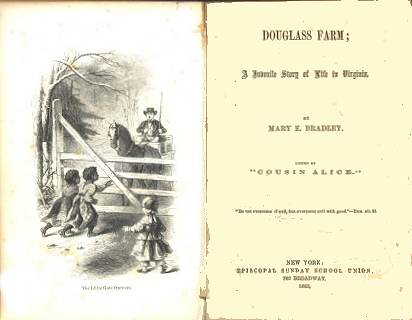Mary Emily (Neely) Bradley and Kate J. Neely (Festetits)

Mary Emily Neely was born in Easton, Maryland, in 1835; her sister, Katharine J. Neely,
was born in Virginia in 1837. They were the youngest daughters of a schoolteacher.
Both began writing for periodicals while in their adolescence.
In 1853, Mary Neely married
George Bradley. He was the brother of two authors -- the
highly-popular Alice B[radley]. Neal
Haven, who wrote under the pseudonym "Cousin Alice," and
Cornelia H[olroyd]. B[radley]. Richards, who sometimes used the pseudonym Mrs. Manners and whose husband
(William Carey Richards) for a time published periodicals in Richmond, Virginia.
With such family members, it is hardly surprising that Mary Bradley was soon able to market her poetry and fiction. Her first children's book, Bread upon the Waters, appeared in 1855, with an introduction written by her sister-in-law. Her second, Douglass Farm, came out in 1856 and also had introductory material by Cousin Alice; it was reissued in 1972 as part of the Black Heritage Collection. [1] From 1855-1870, Mary Bradley published almost a dozen juveniles, fiction and non-fiction, frequently with religious presses. Her only series was co-written with her sister Kate and issued by Lee & Shepard from 1868-70. Like her sister-in-law Cousin Alice's Home Stories, Bradley's Proverb series is linked only by the concept of using proverbs for book titles.
After 1868, Bradley concentrated more on poetry than prose, and her verse appeared in popular periodicals including Harper's, Appleton's, and Scribner's. She also wrote poetry for children, and from 1874 until at least 1891, was an occasional contributor to St. Nicholas. [2] Her last work appears to be a memorial poem, "To Rose Terry Cooke," from the November 1892 issue of Century. She died in 1898.
Kate Neely began publishing books in 1859. Her first book, Ellie Randolph, was issued by the General Protestant Episcopal Sunday School Union, who also handled several of her sister's books. Kate may also have been living with Mary and her family at the time. Like Mary, Kate also sold some stories to periodicals, though her output was significantly less than her sibling's. [3] During her career, she used several variants of her name: her early books were by "Kitty Neely"; her magazine articles, by "Miss K. J. Neely." From 1868-1870, she was "Kate J. Neely" for the three volumes she contributed to the jointly-authored Proverb series, her only series for children.
In 1871, Kate married Count Albert Festetits. He was a civil engineer who had emigrated from Hungary a few years earlier. The couple had at least one child, a daughter who graduated from college in 1891, the same year the Count died. His obituary stated that "Although it was known among the Count's friends that he was of noble family, no one knew that he was actually a count. After his death, his wife communicated to one of his friends the fact that her husband was a count and exhibited documents which proved it beyond dispute."
Nine years elapsed between the last volume in the Proverb series (One Good Turn Deserves Another [1870]) and the publication of her next book, The Flower-Mission, and What Grew Out of It (1879). By then, she had adopted the pseudonym Kate Neely Hill, which she maintained until 1889, when she began using her married name on books, publishing as Kate Neely Festetits. Her last book, Stephen Hardee, was issued in 1897, as by "Katharine N. Festetits." The date of her death is not known.
Notes
[1] The rationale for its inclusion in the Black Heritage Collection is not known.
Douglass Farm is a domestic story set in Virginia. The Douglass family owns slaves
who appear frequently in the story as valued servants, but the African-American characters
are neither protagonists nor central to the plot.
[2] Mary Bradley's poems and short stories for Harpers' and Scribners are
online at Making of America's Cornell site; those for Appleton's are online at MOA's U of Michigan site. One book by Bradley, The story of a summer; or, What do ye more than others?, is also online at MOA-Michigan.
A partial bibliography of her contributions to St. Nicholas is
at FictionMags.
[3] Kate J. Neely's short stories for Harpers' are online at
Making of America's Cornell site;
those for Appleton's and Sabbath at Home are online at MOA's U of Michigan site. (The one Sabbath at Home story, a juvenile, is bundled with a group of religious pamphlets.)

